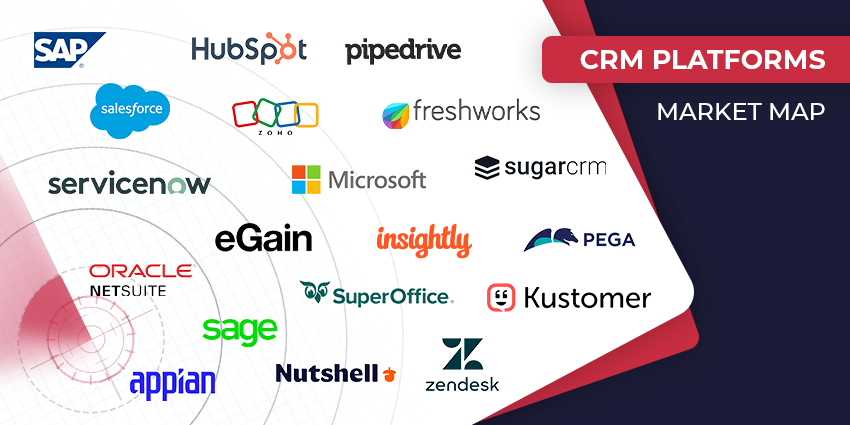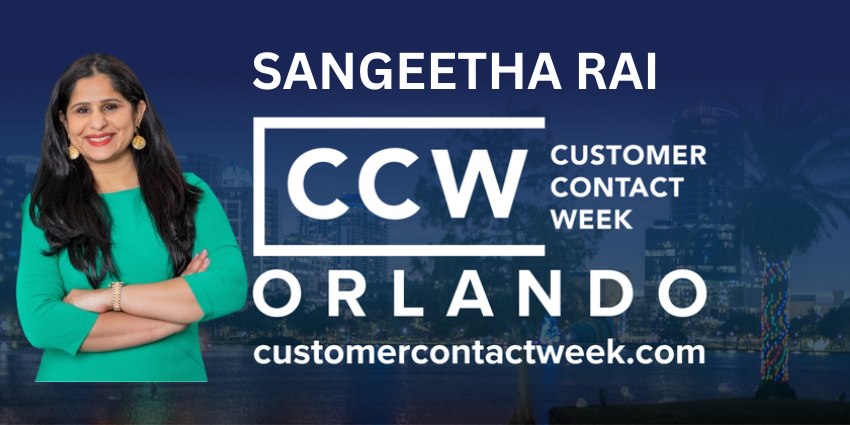The top CRM vendors are reshaping customer service at a bigger scale than ever before. The software is evolving fast. What used to be little more than a database for contacts and deals is now the brain of the entire customer operation.
In 2025, the best CRM software doesn’t just track leads, it fuels sales intelligence, orchestrates cross-channel journeys, and gives teams the visibility and automation they need to scale smarter.
Now a crucial cornerstone of the CX stack for businesses of all sizes (91% of companies with more than 11 employees use CRM software), this tech is crucial to business success.
As the market continues to grow, towards a projected value of $262.74 billion by 2032, choosing the right partner can be challenging. This guide introduces a snapshot of some of the top CRM vendors featured in our CRM marketplace, and what they’re really doing for enterprise brands.
The Top CRM Software Vendors in 2025
The Top CRM Software Vendors in 2025
Choosing the right CRM is about more than just “comparing features”. Companies need to consider fit. How well the platform slots into existing systems, supports remote and hybrid teams, and adapts as business needs change.
In 2025, top CRM vendors aren’t just selling contact databases. They’re helping organizations rethink how customer relationships are built, measured, and scaled. The list below highlights some of the best CRM vendors available right now.
Salesforce
With a dominant 21.7 percent share of the market, Salesforce is often the first brand that springs to mind when weighing up the top CRM software vendors.
Its CRM solutions include Service, Sales, Market, and Commerce Cloud, alongside individual platforms for nine specific industries.
Salesforce connects all its CRM apps with Data Cloud, its customer data platform (CDP), unifying data across the customer experience ecosystem. In 2024, it launched Agentforce, allowing customers to implement autonomous AI agents across that ecosystem, turning its data and insight into action.
In doing so, Salesforce led the AI pivot from copilot to autopilot. Salesforce also offers Tablaeu, MuleSoft, and Slack, each bringing unique benefits to its CRM ecosystem.
Yet, despite its broad portfolio, Salesforce maintains the rapid development of its core CRM apps.
For instance, last year, it introduced new product discovery tools, an updated contact center integration program, a personalization decision engine, and so much more.
Meanwhile, the vendor also completed acquisitions of Own Company, PredictSpring, and Tenyx.
HubSpot
HubSpot’s come a long way from its startup roots. The 2025 version of the platform is designed for scale, with new tools built not just for marketers, but for enterprise sales, ops, and CX teams too.
The recent update includes over 100 new features, most notably AI Agents, smarter data hygiene tools, and a complete refresh of Sales Hub with forecasting, scoring, and automation upgrades. There are both free and premium versions of the CRM software available.
Plus, companies get built-in collaboration tools to unify and align CX teams.
More advanced versions of HubSpot’s CRM technology come with various intuitive solutions for ad scheduling, integrated customer communication, lead management, and sales funnel analysis.
HubSpot also gives users access to numerous generative AI tools that assist with the development of creative marketing campaigns and the delivery of rapid self-service.
Like Salesforce, HubSpot has shifted to a multi-CRM strategy to provide that all-encompassing customer experience environment.
Additionally, its Founder, Dharmesh Shah, is developing a network of AI Agents, which – as of January 2025 – already had 250,000 users. Shah hopes that this platform will – in time – become part of HubSpot’s core offering.
Zoho
Zoho is unique in building out its own infrastructure to host its enterprise technologies, including its CRM platform.
Ultimately, this strategy has helped the vendor lower its costs and – as a result – reduce the total cost of ownership (TCO) for its customers. That’s a massive plus.
In terms of its feature set, Zoho CRM enables businesses to deliver omnichannel experiences with embedded tools for segmentation, predictive intelligence, and KPI analysis.
There are AI-powered bots (Zia) to support both agents and customers, as well as rich workflow automation capabilities.
Beyond AI, new features include rollup summaries for quick pipeline metrics, custom scripting for deeper UI control, and expanded Voice‑of‑the‑Customer tracking with review and kiosk integration.
Zoho CRM is also highly customizable, with one-click integrations for leading tools like Shopify, Zoom, and MailChimp. Like some other top CRM software vendors, Zoho also offers specialist solutions for specific business needs, such as a Google Workspace CRM, help desk, and social CRM solution.
Microsoft (Dynamics)
Known for its mammoth stack of enterprise software, Microsoft is a prominent global vendor of customer relationship management platforms, thanks to Dynamics 365.
The solution integrates with other tools in the tech company’s portfolio, such as Microsoft Power BI, Teams, and Outlook. Teams can easily collaborate without shifting across so many apps.
Customers can leverage Dynamics 365 alongside the Power Platform to create comprehensive automated workflows and link distributed technologies throughout their ecosystems.
Plus, Microsoft Dynamics 365 is currently reinventing itself through AI. The 2025 update brings Copilot baked into Sales, Customer Service, and Field Service apps, making CRM feel more like a personal co-worker.
Coupled with a unified Dataverse data model and low-code Power Platform governance, it gives enterprises the foundation to build custom Copilot agents and unified workflows, all under corporate control.
Finally, like Salesforce, Dynamics offers industry-specific CRMs. As more customers request preconfigured automation across common industry workflows, these CRM apps will come into their own.
Oracle NetSuite
Powered by Oracle Cloud Infrastructure (OCI), NetSuite is a comprehensive CRM solution.
Its software toolkit combines collaboration, accounting, ERP, and business management tools into a single environment, along with traditional CRM capabilities.
That single environment gives Oracle many customers access to data from across the enterprise, bolstering their data and AI strategies.
In terms of its individual CRM apps, Netsuite covers sales force automation, marketing automation, customer service management, and partner relationship management.
Oracle also ensures sales, marketing, and service teams can leverage shared dashboards for real-time insights into opportunities and crucial customer pain points.
Meanwhile, its mobile CRM offering is strong, making Oracle a firm favorite among top CRM software vendors in sectors like healthcare, real estate, delivery services, etc.
SAP
SAP’s CRM platform is now deeply woven into its broader Business AI and data strategy, making it one of the top CRM software vendors to watch in 2025. Like Oracle, Microsoft, and Zoho, SAP benefits from its broad ecosystem, which includes its widely-utilized ERP solution.
SAP has put significant time into solidifying the connection between its CRM and ERP solutions to drag more data into the customer experience ecosystem.
Now, with Joule, SAP is reaping the rewards, as its AI agents can leverage that data to better inform sales proposals, personalize marketing campaigns, and automate customer communications.
SAP is also a vendor highly regarded for building CRM solutions with a modular architecture that allows for high customization and extensibility.
Altogether, SAP offers CRM solutions for eCommerce, marketing, customer service, and sales teams, all featuring end-to-end automation capabilities and robust reporting capabilities.
Pegasystems
Pegasystems isn’t only a well-known CRM provider. It’s also a highly regarded enterprise workflow automation and low-code applications provider.
In early 2025, Pega was named a Leader in The Forrester Wave for CRM, with analysts highlighting its “AI for summarization, insights, knowledge, coaching, and agentic workflows” as standout strengths.
In combining these strengths, Pegasystems considers all the processes within customer experience alongside those that extend into the broader enterprise environment.
From there, the vendor aims to help organizations mine, optimize, and automate those processes.
Now, with the rise of agentic AI, Pega has proven ahead of the game, as this work will help its customers put AI to work faster.
The PegaWorld announcement of Agentic Process Fabric means customers can now connect intelligent agents across systems, pulling insights from legacy apps, documents, video, and wrap governance around every action
Alongside the vision, Pega also offers impressive functionality, as evident in its CRM’s “Customer Decision Hub”. Here, customers can analyze live conversations and journeys to predict customer needs. Pega’s unified platform also uses APIs and integrations to bridge the gap between multiple resources in the CX technology stack, without compromising on security.
ServiceNow
ServiceNow only recently entered the CRM market, but its quickly gaining attention as one of the top CRM software vendors. The ServiceNow CRM, introduced in May 2025, provides companies with a “system of action” for sales, fulfillment, and service.
At Knowledge 2025, its new AI‑powered CRM became its fastest-growing workflow business (over $1.4 B ACV, +30% YoY). The new AI Control Tower gives enterprises a governance dashboard to track agent performance and compliance.
ServiceNow also launched AI Agent Fabric, which stitches third-party and internal agents together, making workflows smarter and more fluid.
That lets CRM act less like a silo and more like a single solution, connecting sales, order management, customer service, and field operations.
ServiceNow also connects CRM solutions with its broader stack, which includes enterprise-grade workflow automation, inventory, and order management systems.
Plus, ServiceNow is a firm favorite of IT teams, thanks to its ITSM software. Now that generative and agentic AI is coming to the fore, IT is increasingly being pulled into the CX software-buying conversations. That will benefit ServiceNow’s play in the CRM space to no end.
Zendesk
While it has a sales CRM solution, Zendesk focuses primarily on the customer service space.
There it differentiates by offering differentiative functionality, like the workforce engagement management (WEM) suite it released in early 2024.
Zendesk’s technology overlaps with many traditional contact center providers, helping businesses to converge their customer service stacks.
Elsewhere, Zendesk hit the headlines in 2024 for its innovative pricing approach, mixing outcome-, usage-, and seat-based models. This makes the company one of the top CRM software vendors for those in search of budget-friendly models.
As companies eventually lower their seat counts, thanks to the influence of AI, such moves are critical for the future of the CRM industry.
Speaking of AI, at Relate 2025, Zendesk unveiled its Resolution Platform, a suite of AI agents built to reason, learn, and adapt across email, chat, and service interactions.
Recent updates also include Action Builder, a no-code orchestration tool that pulls workflows together across CRM, WFM, and third-party tools.
Finally, on that sales CRM, Zendesk supports sales teams with various pipeline management, lead qualification and tracking capabilities.
SugarCRM
Built to align sales, marketing, and service teams, SugarCRM has established a reputation for building robust, technical products.
In doing so, it has maintained a global customer base, particularly in complex industries – like manufacturing – where its technical value proposition can shine.
Recognizing this, SugarCRM has started to focus more on supporting revenue optimization rather than lead generation. After all, that’s what most strikes a chord with these customers.
Its 2024 sales-i acquisition will help here, as will its thriving community and robust app marketplace. Like many of the top CRM software vendors, SugarCRM has been pushing out AI updates lately, for predictive scoring, and workflow alerts.
The Sugar Discover analytics module also gained context-aware dashlets that surface data linked to the record teams are viewing. The mobile SDK continues to receive attention too, with version 85.0 enhancing developer control and user experience on the go.
Also, SugarCRM appointed a new CEO last year, which may help to enhance its communication with this crucial customer segment.
Appian
More than just a standard CRM vendor, Appian is a workflow automation and business intelligence software vendor.
Appian has quietly carved a niche as the go-to low-code process platform that embeds CRM scenarios into broader enterprise workflows. At Appian World 2025, the company highlighted real-world use cases: financial institutions embedding AI into risk & onboarding processes, and service orgs automating cross-channel resolution with centralized case management
The company offers organizations tools that enable them to monitor, optimize, and track various customer experience tasks, from pinpointing leads to delivering customer support.
Additionally, Appian offers intuitive solutions for orchestrating governance, risk, and compliance processes. Clients are also using Appian to build agentic workflows, where process logic, generative AI, and governance come together to drive outcomes.
For companies looking to take an especially innovative approach to customer relationship management, Appian offers a unique alternative to most of the top CRM software vendors.
Freshworks
Like HubSpot, Freshworks is a firm favorite CRM vendor amongst SMBs. Why? Because of its simple cost model and speedy time to value.
Businesses can get up and running on Freshworks quickly, with many reporting how they can set up Freshworks’s CRM solutions without assistance from the vendor or a third party.
Freshworks continued its bid to be the “easy” CRM provider in 2024 by launching its “uncomplicated” AI Agent, Freddy, with a free trial and straightforward licensing.
It also continues to broaden its agentic AI capabilities through 2025, embedding intelligence deeply into pipeline workflows and customer support operations.
Also, the vendor’s platform features many enterprise-level features – from workflow automation to a 360-degree customer view – despite its reputation for serving smaller businesses.
Finally, Freshworks offers AI-based lead scoring and prospecting tools for sales teams, virtual agents for self-service, and integrated messaging and voice communication features.
Kustomer
Once owned by Meta, Kustomer presents a CRM solution deployed within many customer service environments.
Businesses working with Kustomer will find that its offering is highly customizable, which helps to ensure a more seamless transition when switching CRMs.
In Spring 2025, Kustomer introduced AI Agents for form submissions and conversational workflows, laying the groundwork for more autonomous customer care. The Summer 2025 release included AI Agents for voice, multi-party email, and deeper omnichannel enhancements.
Its core promise is a unified, contextual timeline where every email, chat, call, or interaction lives alongside smart AI suggestions. Enterprise-grade features now include voice-based escalation, Shopify chat automation, and no-code workflow automation .
Pricing tiers offer both per-user and per-conversation models, with enterprise plans including AI agents for both customers and reps.
Sage
Sage CRM is part of a large, enterprise-grade ecosystem, and in early 2025 it got a full refresh through Sage CRM 2025 R1. That update brought performance enhancements, a modern UI, enhanced Exchange Online integration, and stronger security compliance.
Now gaining ground as one of the top CRM software vendors, Sage’s tech supports companies with optimizing and automating various stages of the customer journey, aligning sales, service, and marketing teams.
With built-in collaboration features and actionable reports on team performance, companies can pinpoint ways to unlock new business results.
Additionally, there are AI-powered tools for drawing deeper insights from data, including sentiment and intent.
Sage’s CRM platform also provides access to bespoke reporting and dashboard features, automated workflows, and a range of integrations.
Lastly, businesses can align Sage CRM technology with other products from the vendor, like HR and accounting tools, to connect the customer and employee experience ecosystem.
eGain
Best known for its knowledge management software, eGain also offers CRM functionality to customer service teams alongside virtual assistants and co-browsing tools.
eGain is also investing significantly in the world of generative AI, giving companies access to intelligent assistants for automating knowledge tasks, journey mapping, and customer self-service.
In March 2025, it launched its AI Agent for Contact Center, which integrates with Amazon Connect, Genesys, and Salesforce, enabling agents to access context-rich knowledge and guided responses in real time.
The same quarter, eGain secured multiple enterprise contracts, including with a global airline, highlighting its proven capability to centralize dispersed knowledge bases and drive first-call resolution +37%, along with +30 NPS improvements
With eGain, Companies can drive insights from customer interactions across every communication channel and build their own self-service knowledge hubs.
Pipedrive
Pipedrive remains a standout in the Top CRM software vendors space, offering clean simplicity with AI-powered smarts tailored for growing teams.
The organization’s comprehensive sales software toolkit comes with a complete CRM solution, combining lead management and qualification with pipeline management, workflow, and marketing automation.
In mid-2025, the platform expanded its AI Sales Assistant capabilities, offering personalized deal insights, email drafting, and summary generation directly in its pipeline view
The update also brought deeper integrations and data features: automated follow-ups, multi-pipeline management, reporting dashboards, and support for 350+ apps through its Marketplace.
Pipedrive’s software is highly flexible, ready to integrate with the business and data management tools, as well as contact center solutions already used worldwide.
Finally, the vendor promises quick and easy implementation, comprehensive scalability, and access to both historical and real-time customer data updates.
Insightly
Scalable and modern, Insightly’s CRM software supports customer-facing teams, with comprehensive insights into customer journeys and improvement opportunities.
The sales app within the platform includes solutions for driving, assigning, and routing leads to agents, as well as building full sales pipelines.
Meanwhile, marketing teams may leverage a solution that notably features diverse automation workflow builders with A/B and multivariate testing.
In March 2025, it rolled out its Bulk Clear feature, allowing admins to reset fields across multiple records with a click, boosting data hygiene and operational control.
Additionally, there is the Insightly Service portal for customer support. Insightly also continues to emphasize native integration: syncing with DocuSign, Microsoft Outlook, Gmail sidebar, Xero, and Zapier, cementing its role as a CRM hub within go-to-market stacks
Insightly can even leverage a full SLA management center to help ensure they deliver on their service promises.
SuperOffice
SuperOffice is a CRM vendor that prioritizes AI and automation to help align distributed teams across the customer experience ecosystem.
Central to that is the platform’s new UI, fresh for 2025. It’s designed to support businesses in automating desktop processes and allowing employees to leverage AI insights.
Plus, companies can integrate their SuperOffice ecosystem with the platforms they already use.
The SuperOffice CRM platform includes all of the core features companies need for relationship management, from end-to-end pipeline insights to self-service solutions for customers and agents.
There are also built-in tools for performance and compliance monitoring, as well as strong access controls and encryption options for security.
It’s a platform built for people, not just processes. With deep Outlook/Exchange integration, offline capabilities, and industry-specific apps from its marketplace, SuperOffice is ideal for enterprises valuing high adoption and polished simplicity
Nutshell
Promising a simple all-in-one CRM system for B2B companies, Nutshell offers organizations a cloud-based ecosystem packed with useful features.
There are tools for contact management and customer profile building, pipeline creation, lead scoring, and sales and marketing automation.
Moreover, users can take advantage of AI-powered analytics tools, as well as intelligent support bots. Its Spring 2025 roadmap includes AI-powered meeting transcripts, email summarization, marketing automations, form triggers, WhatsApp support, and quote-to-invoice workflows.
Database hygiene is a focus too, with smarter import/export tools and scheduler enhancements. Nutshell also comes with a full reporting suite, as well as AI timeline summarization features, click tracking, and notifications for digital businesses.
Lastly, the platform can also integrate with numerous business resources through one-click integrations and API support.
The Top CRM Software Vendors in 2025 and Beyond
CRM isn’t just a category anymore. It’s the foundation for how modern companies connect, sell, serve, and grow. As this year’s updates show, the platforms leading the way aren’t standing still. They’re adding real intelligence, cutting the admin noise, and giving teams tools that actually help, not just track.
Some of the top CRM software vendors on this list are built for scale. Others are designed for speed. A few are quietly rewriting what CRM even means. But they all have one thing in common: they’re focused on what comes next, whether that’s agentic AI, smarter workflows, or simpler ways to run a global team.
For enterprises ready to take the next step, CX Today is here to help.
Here’s where to go next:
- Dig into the data: Download our latest CRM and CX research for practical insights on what’s changing in 2025.
- Join the conversation: Get real-world advice from peers and share stop tips in the thriving CX Community.
- Experience the tech live: Meet vendors, test tools, and hear from decision-makers at upcoming events.
- Build your roadmap: Use our Ultimate Buyer’s Guide to navigate CRM, UCaaS, and everything in between.
If you’re ready to zoom out and explore where CRM fits into the wider unified comms space, don’t miss this:







